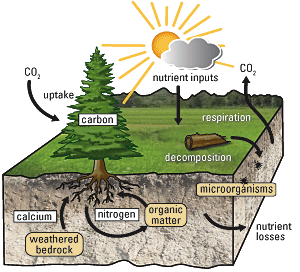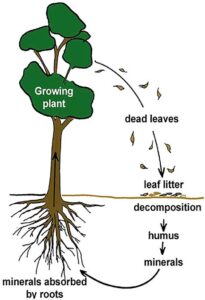Back to: Botany 300 Level
Hello, my brilliant Afrilearn scholar! I hope you’re having an awesome day! Have you ever wondered what happens to all the dead plants and animals around us? Where do they go, and how do they turn back into something useful for the environment? Well, today we’re going to talk about decomposition and how it plays a key role in soil nutrient dynamics. These processes help recycle nutrients and keep the soil healthy so plants can continue to grow. Let’s break it down in a simple and easy-to-understand way!
Decomposition and soil nutrient dynamics
What is Decomposition?
Decomposition is the process by which dead plants, animals, and other organic matter are broken down into simpler substances by decomposers like bacteria, fungi, and insects. This process is essential because it helps recycle nutrients back into the soil, making them available for new plants to use. Without decomposition, nutrients like carbon, nitrogen, and phosphorus would get locked up in dead organisms and wouldn’t be able to support new life.
Example in Nature:
Imagine a fallen tree in the forest. Over time, fungi and earthworms break down the wood, and the nutrients inside the tree are released back into the soil, where new plants can absorb them.

The Role of Decomposers
Decomposers are the heroes of decomposition! They include bacteria, fungi, and small animals like earthworms, ants, and beetles. These organisms work together to break down dead matter.
Bacteria: These tiny microorganisms are the first to get to work on breaking down dead plant and animal material. They use enzymes to break complex organic compounds into simpler molecules.
Fungi: Fungi like mushrooms and moulds help break down hard materials, such as lignin in wood, that bacteria can’t easily decompose.
Invertebrates: Small animals like earthworms and insects physically break down dead organic material by eating it and digesting it, further aiding decomposition.
These decomposers are essential because they recycle organic matter into valuable nutrients, such as nitrogen, phosphorus, and carbon, which plants need to grow.
Soil Nutrient Dynamics: How Decomposition Affects the Soil
Decomposition plays a huge role in the soil nutrient cycle, which ensures that plants get the nutrients they need to grow. As dead organisms are broken down, essential nutrients are released into the soil, where plants can take them up through their roots.
The process of decomposition affects soil fertility—the ability of the soil to support plant growth. Healthy soils are full of decomposed organic matter, which adds valuable nutrients and improves the soil’s texture. Let’s take a look at the key nutrients involved in this process:
Carbon: When decomposers break down dead plants and animals, carbon is released in the form of carbon dioxide (CO₂), which is then used by plants for photosynthesis. Some carbon also remains in the soil as humus, which improves soil structure.
Nitrogen: Decomposers break down proteins and other nitrogen-rich compounds in dead plants and animals, releasing nitrogen in the form of ammonia or nitrates. Plants absorb these forms of nitrogen to build their own proteins.
Phosphorus: Decomposers also release phosphorus from decaying organic matter, making it available for plants to use in growing roots, flowers, and seeds.
The Impact of Decomposition on Soil Health
When decomposition occurs, humus—the dark, rich material formed from decomposed organic matter—is created. Humus helps soil retain water, improves soil structure, and increases soil fertility. Soil with plenty of humus is called loamy soil, and it is perfect for growing plants.

However, the rate of decomposition can be influenced by several factors:
Temperature: Warm temperatures speed up decomposition, while colder temperatures slow it down.
Moisture: Decomposition happens more quickly in moist environments because decomposers need water to break down organic material.
Oxygen: Decomposers need oxygen to survive, so soils that are well-aerated allow for faster decomposition.
Type of Material: The type of dead organic material also affects the decomposition process. Soft, easily decomposable materials (like leaves) break down faster than tougher materials (like wood).
Example in Nature:
In the tropical rainforest, where temperatures and moisture levels are high, decomposition happens quickly, allowing the soil to remain fertile despite the heavy rainfall. In contrast, in a desert, decomposition is slower due to lower moisture levels, and soil fertility can be lower.
Decomposition and Soil Fertility in Agriculture
In agriculture, understanding the relationship between decomposition and soil nutrients is vital for maintaining healthy crops. Farmers use composting, which is the controlled decomposition of organic matter like food scraps and plant waste, to enrich the soil. By adding compost to the soil, they increase the amount of decomposed organic material, improving soil structure and nutrient content.
Example in Agriculture:
If you’ve ever seen a compost heap in a garden, it’s essentially a small-scale version of natural decomposition. Organic waste like vegetable scraps, leaves, and manure break down to form rich, dark compost that is full of nutrients. This compost helps crops like cassava or tomatoes grow strong and healthy.
Summary
Decomposition is the process by which dead plants and animals are broken down into simpler substances by decomposers like bacteria, fungi, and insects. This process is important for recycling nutrients like carbon, nitrogen, and phosphorus, which are essential for plant growth. The nutrients released during decomposition improve soil fertility and texture, creating a healthy environment for plants to thrive. Understanding the role of decomposition helps us appreciate the natural recycling processes that maintain the balance of ecosystems and support agriculture.
Evaluation
- What role do decomposers like bacteria, fungi, and earthworms play in decomposition?
- How does decomposition affect soil fertility?
- Why is humus important for soil health?
- Can you think of some factors that influence the rate of decomposition?
- How does decomposition benefit agriculture, especially in terms of soil nutrients?
Amazing job! You’ve just unlocked the secrets of decomposition and how it supports healthy, fertile soils. Keep learning, and soon you’ll understand even more about how nature works together in harmony. You’re on the right track—keep up the great work with Afrilearn, and I look forward to seeing you in the next lesson!
